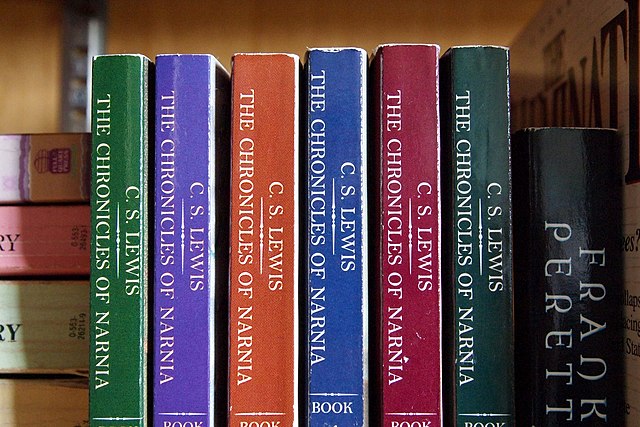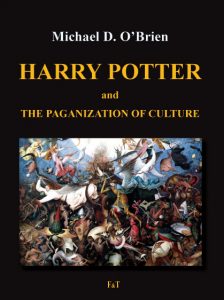 As all regular readers of this blog know, we get many questions about children's books in which the characters use sorcery in one way or another. In an effort to help Christian parents learn how to discern whether or not this content is suitable for their children, I would like to post insights from Michael O'Brien's book, Harry Potter and the Paganization of Culture (www.studioobrien.com) which I hope you'll find useful.
As all regular readers of this blog know, we get many questions about children's books in which the characters use sorcery in one way or another. In an effort to help Christian parents learn how to discern whether or not this content is suitable for their children, I would like to post insights from Michael O'Brien's book, Harry Potter and the Paganization of Culture (www.studioobrien.com) which I hope you'll find useful.In a chapter on Christian fantasy writing, O'Brien compares the magic found in occult fiction such as Harry Potter to that which appears in Christian classics such as J.R.R. Tolkien's Lord of the Rings and C. S. Lewis' Chronicles of Narnia.
Essentially, the problem is not so much that magic is present in the book, but how the magic is presented. The Potter books use magic in a way that turns the moral order on its head with grave distortions of good and evil. For instance, so-called "black" and "white" magic (a distinction that does not exist) is used by both good and bad characters in the book. This makes magic morally neutral, taking it out of the moral realm completely and making it into a kind of tool.
"If magic is presented as a good, or as morally neutral, is there not an increased likelihood that when a young person encounters opportunities to explore the world of real magic he will be less able to resist its attractions?" O'Brien asks. "Of course, children are not so naïve as to think they can have Harry's powers and adventures; they know full well the story is make-believe. But on the subconscious level they have absorbed it as experience, and this experience tells them that the mysterious forbidden is highly rewarding."
Occult fiction often includes other distortions that can have a negative effect on a child's moral outlook. For instance, in the Potter books adults are presented as mean and those who don't practice magic to be backward. The books can also be overtly anti-Christian, such as the trilogy, His Dark Materials by Philip Pullman, in which God is openly maligned.
It should come as no surprise that occult-based fiction has produced some rather dark and bitter fruits (which are rarely publicized for obvious reasons.) For example, a January 2006 Barna report on teenage views and behavior regarding the supernatural indicates that "three-quarters of America's youth (73%) have engaged in at least one type of psychic or witchcraft-related activity, beyond mere media exposure or horoscope exposure." One out of every eight teens (12%) said the Potter books increased their interested in witchcraft, a number which amounts to almost three million young people in the U.S.!
Contrast this with Christian fantasy, which has caused no such turn to the occult. Why not? The Chronicles of Narnia are loaded with magic, as is the Lord of the Rings. What's the difference?
The difference is that these writers portray magic in the proper context and without upturning the moral order.
 As O'Brien explains, throughout Lewis' fiction, witches are portrayed in classic terms, as malevolent, manipulative and deceiving. An example would be the witch in The Silver Chair who mesmerizes the children to convince them that there is no sun. But one character, the Marsh-wiggle, deliberately burns himself in the fireplace to shock his mind back to reality. When he snaps out of it, he confronts the witch who then reveals her true nature by turning into a serpent, thus alerting the children to their peril.
As O'Brien explains, throughout Lewis' fiction, witches are portrayed in classic terms, as malevolent, manipulative and deceiving. An example would be the witch in The Silver Chair who mesmerizes the children to convince them that there is no sun. But one character, the Marsh-wiggle, deliberately burns himself in the fireplace to shock his mind back to reality. When he snaps out of it, he confronts the witch who then reveals her true nature by turning into a serpent, thus alerting the children to their peril.
In The Lion, the Witch and the Wardrobe, the four Pevensie children discover a wardrobe that leads them into the land of Narnia. One of the children is then tricked by a witch posing as a beautiful queen who tempts him with treats and promises of power if he will turn on his siblings. He does so, but when he later learns the true nature of the witch, he regrets his action and repents. But he cannot be free of the dominion of the wicked witch until he pays his debt, something that Aslan, the Christ-figure presented in the form of a lion, agrees to do. Aslan sacrifices his own life in exchange for the children, but then miraculously returns to life and liberates Narnia, crowning the children kings and queens of Narnia.
"This is salvation history, distilled in the form of Story," O'Brien writes.
The same holds true with Tolkien, where magic is also portrayed as fraught with deception. As O'Brien explains, the character named Gandalf, who is often referred to as a wizard, is not a classical sorcerer. Rather "Gandalf's task is to advise, instruct and arouse to resistance the minds and hearts of those threatened by Sauron, the Dark Lord of this saga. Gandalf does not do the work for them; they must use their natural gifts to resist evil and do good - and in this we see an image of grace building on nature, never overwhelming nature or replacing it."
Instead, Gandalf's gifts are used sparingly, and then only to help others in the exercise of their free will and moral choices. "It is only an assist, never a replacement."
The proper moral order is also reflected in the way Frodo realizes that the ring he has been entrusted with has great powers and he is constantly tempted to use them for the good. "But he learns that to use its powers for such short-range 'goods' increases the probability of long-range disaster, both for himself and for the world."
Tolkien makes it clear that "such powers are very much a domain infested by the 'deceits of the enemy' used for domination of other creatures' free will. They are metaphors of sin and spiritual bondage."
Compare this to Potter-type literature.
"In neo-pagan fantasy literature, magic in the hands of both 'good' and 'bad' characters is frequently used to overwhelm, deceive and defile," O'Brien writes. "In the Potter series, Harry uses his powers to overwhelm, deceive and defile his human enemies, and he resists Voldemort with the very powers the Dark Lord himself uses."
This same distortion of good and evil is present in the Twilight series which posits the existence of "good" and "bad" vampires. Of course, this can never be true. As E. Michael Jones writes, vampirism the antithesis of Christianity. "Whereas Christ shed his blood so that his followers could have eternal life, Dracula shed his followers' blood so that he could have eternal life."
Make no mistake, occult-based fictional heroes and heroines have an impact on a child's ability to distinguish truth from falsehood, good from evil.
As O'Brien explains: "A novel about a boy who regularly skips along a tightrope across Niagara Falls without falling is no real threat to one's child, because he instantly recognizes the absurdity of the notion. The danger is immediately perceived and the practice rejected. But a novel about a boy who skips along a tightrope across an eternal abyss is a real threat, for the danger is difficult to recognize without knowledge of moral absolutes and a developed sense of the immediacy of spiritual combat. Parents' warnings about abstract dangers can pale in a child's mind when compared to tales packed with potent images that have lodged deeply in his imagination."
Any parent who is concerned about the ever-darkening trends in children's literature needs to read this book because it gives a thorough explanation of the problem and is loaded with tips on how to discern the good, the bad and the ugly in modern reading material.
© All Rights Reserved, Living His Life Abundantly®/Women of Grace® http://www.womenofgrace.com
